E-commerce always surprises us. There’s something interesting popping up every now and then that catches our attention and hook us towards it. The spirit of such innovative ideas is what keeps the eCommerce business going which we are continuing to know more about it.
Tag: ecommerce marketplace
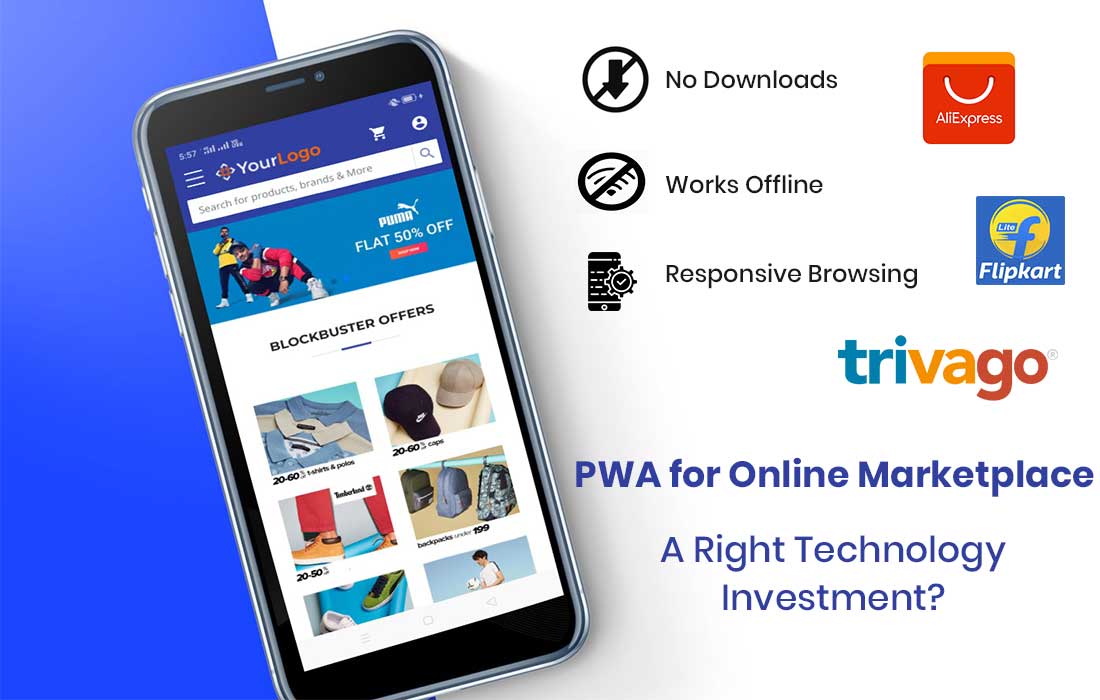
PWA for Online Marketplace: A Right Technology Investment?
Experimenting with new technology for an online marketplace can be scary, but should you be afraid of PWA?
Progressive Web App is the talk of the town, and the praises for its benefits have no end, yet, when it comes to investing in it, the cloud of suspicion forms in our head and gets stuck at one and the same point, “whether to invest or not?”
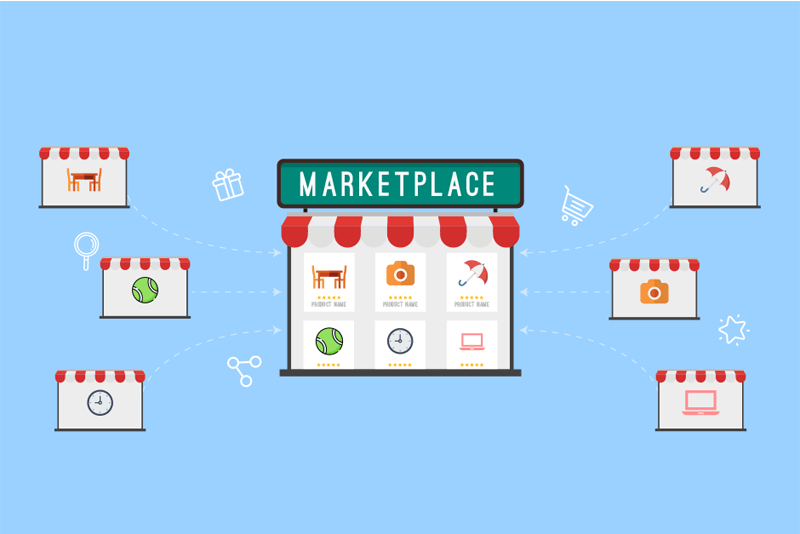
Magento Multivendor Marketplace has Brought a New Level of Personalization to B2B
Magento’s reputation has been built upon its bang for buck and strong digital commerce solution for businesses ranging from small to mid-sized.There are a host of plugins available and supported by Magento that make implementation of an ecommerce marketplace business model on this platform highly feasible. These are those features that are considered to be a must have for a marketplace webstore. And that kind of modularity offered by Magento makes it one of the most user-friendly ecommerce development platform currently available on the market. Additionally, that also makes personalizing your Magento based ecommerce store a breeze.
Personalization is key for Magento multivendor marketplace
We are not talking about the personalization offered that is ironically generalized, i.e., one which is focused on a specific demographic as opposed to individual customer. But with Magento multivendor marketplace, individual consumer centric personalization is possible. No two consumers will be shown same products, categories or prices. But before we delve into how Magento makes it possible we need to familiarize ourselves with multivendor marketplace.
A multivendor marketplace is an ecommerce platform where products from multiple vendors are marketed at a common marketplace, for instance Amazon, eBay.
The need for a multivendor marketplace
So why should one create a multivendor store? an entire new dimension of possibilities is opened up by a multivendor marketplace which the single vendor ecommerce stores just simply can’t beat.
It gives you room to create a webstore to sell virtually anything to a category specific online store that sells products for that one category from multiple vendors, for instance electronics, clothing, etc. We have barely scratched the surface of its potential.

You extend the range of your webstore by offering products from other vendors which you natively can’t provide. The site traffic is propelled higher and the management time for store is also drastically cut down. One of the biggest advantages that the multivendor marketplace offers is the freedom from worrying about the inventory management since there is virtually no inventory to keep, you in fact act as a moderator for suppliers as opposed to being a supplier yourself.
Recommended Blog: A Handy Guide to Pick The Right Multi-Vendor Marketplace for Your Business
To add to above, the personalization offered goes even deeper wherein the vendor can enable or disabled their specific merchandise and the admin can remove or disable individual or multiple products from the seller.
How is Magento marketplace personalizing B2B
The below mentioned factors are key to creating a highly personalized shopping experience
1. Intuitive navigation and search: Ensuring that the consumer navigate your site easily and discover their sought products conveniently is key. Magento multivendor marketplace does that by enabling synonyms, filters, sorting by business rules, and auto suggestions. It is the easiest method that converts customers in the fewest no. of clicks possible.
2. Account personalization: You have the facility of customizing your customer’s account which your consumer seeks as he wants you to understand his business and predict his needs. Account personalization delivers on that with simplified ordering made possible by targeted messaging.
3. Tailored, dynamic pricing: You can dramatically improve your consumer relations via dynamic pricing. It enables you to show through prices the negotiated contract pricing terms and pre- configured business rules. This also boosts the profit earned.
4. Product recommendations:Offering your consumer carefully curated shopping recommendations is another personalizing aspect that is executed with precision by Magento multivendor marketplace. Consumers want the convenience of retail shopping experience provide that with product recommendation based on consumer shopping habits.
5. Quick repeat ordering: B2B customers usually know exactly what they want and will order again. Make purchases easier by highlighting their previous orders and automating re-orders.
6. Loyalty programs: Another way of strengthening consumer relations and personalization, is loyalty program. Each of your consumer can be offered a reward scheme based on their shopping trends on your webstore and encourage them to shop more. This will cultivate a sense of value in the customer.
7. All devices: Personalization is also focused on optimizing your features for all devices and not just desktops. These include smartphones and tablets. You have to realize the essentiality of mobile B2B, the days of solely focusing on desktop ecommerce are passéd.
8. Automatic Payment to Vendors Via Paypal: Further features that have been brought to the Magento marketplace have boosted further the level of personalization. The Marketplace Paypal integration has enabled the admin to transact with vendor who market products in the webstore. Earlier the payment wasn’t automated but now with this feature it is. You have choice of 3 payment options. You can choose from
• Pay instantly whenever a productis purchased on the site.
•You can also make payment when the order is completed, i.e., delivered to the consumer
•You can even pay each vendor in accordance with their admin billing panel rank based on their earnings from sale.
9. Ability to Create Configurable Products: This feature was added solely focusing on the level of customization that can be offered. Earlier that wasn’t possible and the vendors had to get their products configured anywhere else, now it can be done directly from the marketplace itself. Before supplier was only able to upload simple products, and it was only the admin who could categorize those via admin dashboard.
Now, you can very easily create configurable products that too via supplier’s dashboard and you can group them on a page together allowing the consumer the freedom to choose any product from the page of their choice.
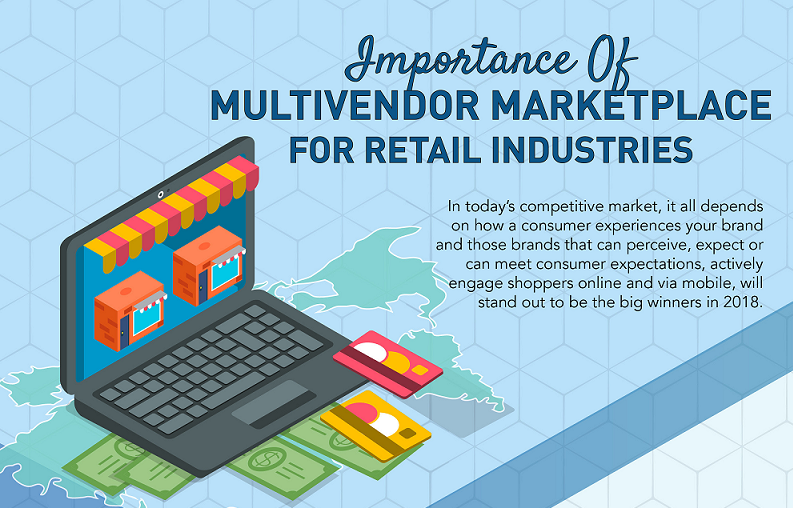
Infographic – Importance of Multivendor Marketplace for Retail Industries
A lot of changes have occurred in the eCommerce industry since its origin. Ecommerce nowadays has taken a faster pace. Selling own products solely to offering products from multiple-sellers is a trend e-commerce/business owners are adopting. Online stores are taking a quick shift towards Marketplaces.
Reasons of E-commerce shift to Marketplace
-
- In 2016, Amazon generated 22.99 billion U.S. dollars in third-party seller service revenues, up from 16.09 billion U.S. dollars in the previous year. Seller-service revenues account for the second-largest revenue segment of the online retail platform.
- Customer Retention: In comparison to single ecommerce stores, a multi-vendor marketplace helps in retaining up to 89% of the customers.
- Revenue Boost: Sales through Multivendor marketplaces will account to almost thrice as compared to online stores by 2021.
- Huge Traffic: Multi-vendor stores helps in grabbing more traffic in comparison to single online store.
- High Conversion Rates: Multi-vendor marketplaces offer a variety of products so that your customers need not look in to the other stores thereby increase in loyal customers and high conversion rates.
- Earn High Commissions: More varieties, more offerings, more sales, therefore more commissions in your pockets.
Take a sneak peek to the Custom Writing’s Infographic below to know the Importance of Multi-vendor Marketplace for Retail Industries.

A Handy Guide to Pick The Right Multi-Vendor Marketplace for Your Business
Just like major malls and supermarkets, e-commerce has also come to a stage where the giants in the field have brought not one, but several vendors on board in order to attract more fish in the sea.A multi-vendor eCommerce marketplace is a huge virtual shopping mall that offers innumerable types of stuff to buy. Today, people barely even want to move from their comfortable chairs and sofas, out onto the busy streets just to shop for some stuff that allures them. In 2017, the E-commerce market had a whopping 2290 billion dollar sale and is expected to reach 2774 billion sales. E-commerce market has eliminated the need for people to strain their muscles by giving its customers a huge variety of products to keep them busy choosing for a good amount of time. And what’s more? It’s cheaper!
WhyMulti-Vendor eCommerce Marketplace?
Digitalizing the world has come to a point where anything, from vegetables to those little beads on that sofa cover can be bought online at moderate prices. This has been possible due to various kinds of vendors coming together on a common platform to share their products with the customer, thus giving them a wholesome shopping environment. 1.61 billion people chose to buy things online in 2016. The total global sales are expected to reach a whopping 4.06 trillion US dollars in the year 2020.
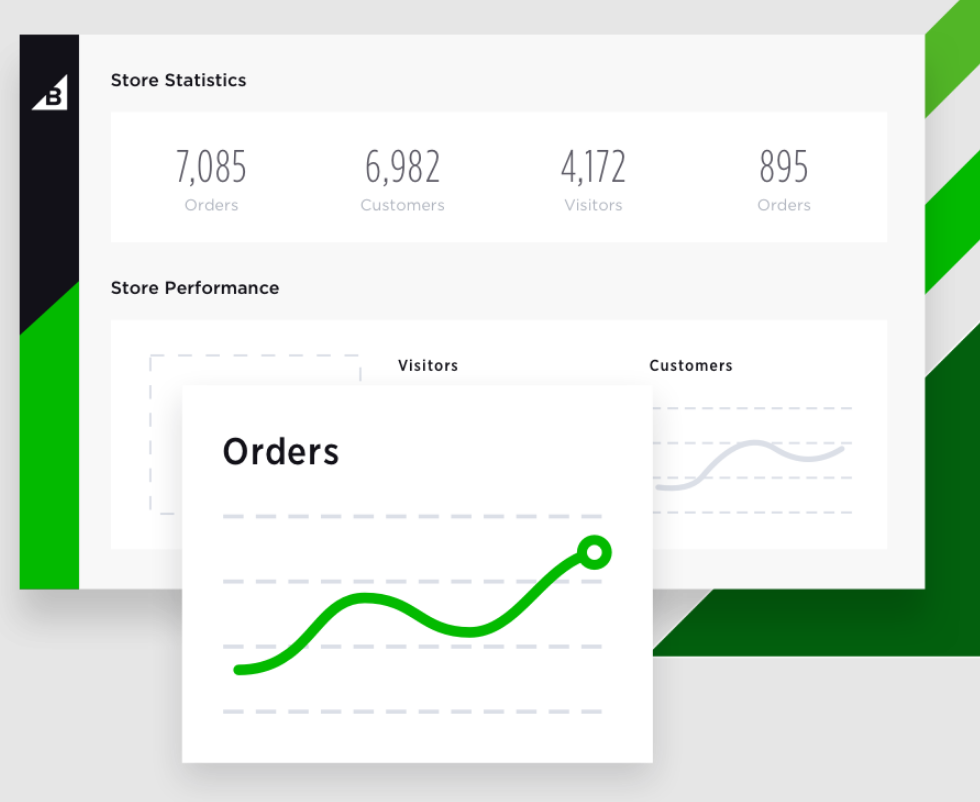
So what are its benefits over a single vendor marketplace? It keeps all, the business owner, the consumer, and the vendor happy. Let’s find out:
1. A commission can be asked for from the vendor in exchange for giving their products some space in the e-commerce website that the business owner handles. This commission can be based on the number of products sold, the total amount made in the month, etc. depending upon the owner and vendor mutual agreement. This grows the overall profit of the business owner.
2. Consumers can buy directly from the platform as the stock is readily available and prices are mentioned right on the screen. No hustle-bustle, whatsoever!
Recommended Blog: Why Customer Engagement & Retention is Important for Businesses
3. Timing is no more an issue due to the fact that the e-commerce platform is available 24*7.
4. Vendors would automatically get more recognition by attaching themselves with a running e-commerce multi-vendor renowned giant. Even the minor vendors, who cannot start their own websites, can easily approach the bigger e-commerce businesses and start selling their products there and make good profits.
5. Overseas sales, that were once a great deal, have now become a piece of cake!
6. Inexpensive and excellent quality products, with utter variety, are available for the users to look at and choose from.
7. Comparison of products has become oh so simple. All one has to do is open the other website and look at the price of the same product, instead of going shop to shop and confirming prices.
8. Products and their costs are regularly updated and thus the users cannot be blinded or fooled anymore.
9. With the ease of mobile app commerce, the users are given constant updates on the latest deals and can access them anywhere, anytime, even while spending the first few minutes of the day in the washroom.
How to choose the right Multi-Vendor E-Commerce Marketplace for your Business?
Before coming to the final conclusion of picking the Marketplace, one needs to keep in mind a few major factors in order to gain the most from it.
1. Vendor Management and Support
It is important to note that the e-commerce business is giving all sorts of comfortable and required support to the vendors which include the registration of vendors, product picture uploading, management of inventory, costing, delivery, and obviously the commission standards. Make sure it is authentic and easily manageable.
2. Performance Statistics
Going over the history and previous year sales and performance can give a good outlook of how the e-commerce website operates. Look at the customer visitation statistics and build a graph to come to the conclusion.
3. User Interface of the Mobile App
Every other individual is using mobile apps these days to do the simplest of the tasks. It is important to have a catchy, yet easy to use interface, making it more feasible for the user to select from the available products and make one-click payments. The search and filter algorithms must be well refined to cater to the impatience of today’s customers. It doesn’t take long to direct them out of the website/app.
4. Cost Effectiveness
Before finalizing which marketplace to invest your products in, it is a necessity to compare the costs of the shortlisted e-commerce solutions. There might be a good variation in them depending on the platforms used to build the websites, i.e. Magneto, WordPress, etc.
5. Customer Reviews
Customers do not mind giving good reviews to something that satiates them completely. Going through customer reviews and ratings could give a good understanding of how good the e-commerce marketplace is running.
Going through these points should sure come handy in selecting the right e-commerce marketplace for your business. Clearly, there is no reason why this market should fall down in the next few years. However, in order to keep up in the game, one has to be updated and innovative.
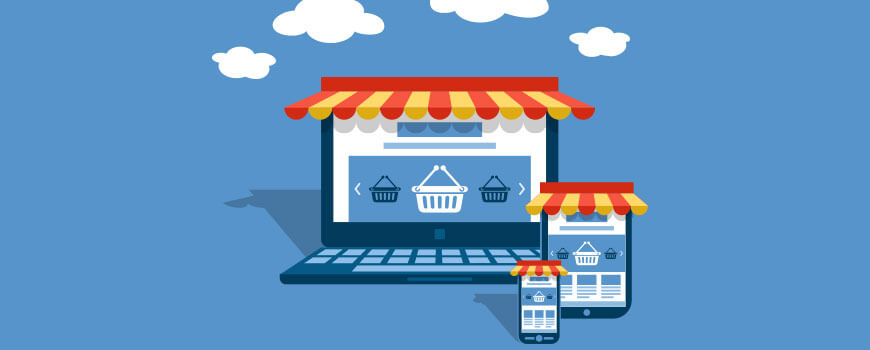
6 Reasons Local Businesses Need Online Stores
Opening an online store is easier than ever. There are dozens of great e-commerce platforms that allow merchants with no coding experience to build up and run complex online store systems and reach customers from all around the world.
Since the use of mobile internet also saw a huge increase in recent years, many business owners decide to optimize their online stores for mobile users. This is another process that’s simplified by latest tech and platforms like MobiCommerce – ecommerce mobile app builder, which enable e-commerce beginners to easily target consumers who use mobile internet.
In this article we will analyze benefits that e-commerce brings to small local businesses and give you 6 reasons why you should add an online store to your business strategy
1. E-commerce overcomes geographic limitations
If you want local store to become global, you should upload its offer to a web server. Traditionally local businesses are targeting customers who live or work nearby, while online stores give them the chance to overcome geographic limitations and present their offer to people all around the world. Of course even online stores have their limitations when it comes to customer reach, and these are mostly determined by country customs and shipping rates. Even with these limitations ecommerce drastically increases business’ customer pool.
2. Online stores cut your HR spending
Online retail business could be easily run by one person. Physical stores on the other hand require at least one person per shift, who can’t leave the store during several hours. Bigger stores also require additional workforce that will cover security, bookkeeping, storing and merchandising tasks. Online stores that are run by production companies, don’t even need to hire additional staff.
3. Online stores can use less expensive ways of promotion
Internet retail entrepreneurs are usually much more open to new technologies, which means they use all benefits digital marketing brings. Online merchants usually share their offers directly on social networks and attract more customers with less expensive marketing strategies which include the use of search engine optimization, Google AdWords, local business mobile apps, Facebook Ads etc.
4. Online store requires less space and guarantees a smaller rent
E-commerce works on completely different premise and the whole project can be easily run from home or a garage. One of the reasons for this, is the fact that these stores use website’s product pages as their exhibition area. They also don’t need bigger storage space, because customers who shop in online stores are accustomed to shorter or longer waiting periods. This means that store owner can use this period to obtain ordered item or even to produce it (if the store is connected to production plant). Physical stores on the other hand need to have all of their goods ready and packed, because customers expect to walk out from the store with a product they just purchased.
5. They are open 24/7
Internet works 24/7, and online stores are no different. The moment after your neighbor goes to sleep, some college kid is just making a break from studying, by browsing stuff he/she would like to buy. This brings benefits to both merchants and customers. Merchants will receive more orders, and customer won’t need to rush after work or school and think whether their favorite shop is going to close.
6. Online stores save customer’s time and money
Most online stores offer free shipping, at least in local area, which drastically decreases customer spending. Location based stores require customers to spend time, money and gas in order to buy their favorite item, while online stores bring goods directly at their door. That’s probably one of the reasons why ecommerce is one of the fastest growing internet businesses in recent years.
In the end we should also mention a few disadvantages online stores come with. First and the most important lack of online shopping app concept is the fact that customer can’t see the item before it arrives to their address. Merchants solved this puzzle by uploading sharp, high-resolution imagery and providing extensive information about the product on their product pages. Some of them went few steps further introducing 360 degrees product view, adding links to manufacturer’s website or sending product samples to potential customers. This and many other similar practices will make your online store more competitive and popular among consumers.








